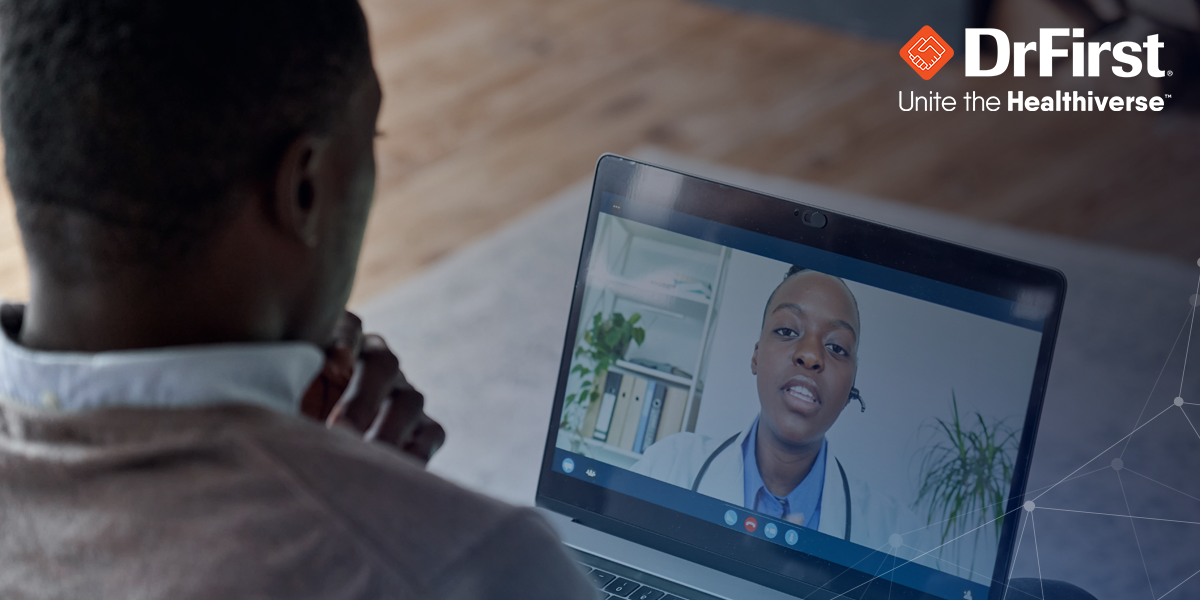Integrated workflows ease staff burden and satisfy regulatory mandates.
Nearly All Patients Using Telehealth for Mental Health Care Want to Keep Doing So

DrFirst survey measures impact of the pandemic on mental health and use of telehealth services
Rockville, Md. – July 8, 2021 – As the world shut down from the COVID-19 pandemic, it significantly impacted patients’ mental health and how they connected with their healthcare providers. A new survey by health technology pioneer DrFirst examined this impact on 1,000 Americans who had accessed mental health services in the previous year, revealing that over two-thirds feel the pandemic made their mental health worse, and most want to continue using telehealth for mental health visits.
While 68% of respondents say the pandemic made their mental health worse, even more (77%) feel their mental health will improve post-pandemic. More than one in six participants (17%) say they accessed mental health services for the first time during the pandemic.
“People around the world have struggled with the stress and uncertainties that came with prolonged social isolation and changes to work and school, as well as concerns whether they or their loved ones would become ill,” said Colin Banas, MD, chief medical officer for DrFirst. “While the pandemic affected everyone, it may have impacted people with anxiety, depression, or other mental health conditions even more.”
Telehealth Takes Off
The survey shows how people seeking mental health services have embraced telehealth. Eight in ten respondents (79%) said their mental health provider offered telehealth during the pandemic, and most of them (84%) said they want to be able to use telehealth moving forward.
“Advances in telehealth have made a tremendous impact in connecting patients and healthcare providers, and the biggest uptick in adoption came for mental health services,” noted Banas. Research shows that less than 1% of behavioral health visits before the pandemic used telehealth.1, 2, 3 That number skyrocketed to 56% by December 2020, according to research by The Commonwealth Fund.4
Special Significance for Patients Seeking Mental Healthcare
While virtual appointments allowed patients, in general, to meet with healthcare providers during the pandemic (when social distancing practices severely limited office visits), its use can be particularly beneficial for mental health visits, according to Banas.
“For people with depression, anxiety, and other mental health issues, the benefits of telehealth are more than simple conveniences and may make the difference for getting care at all,” said Banas. “Even getting out of bed can feel like an insurmountable challenge for some patients. Consider the reasons people gave for liking telehealth – such as wearing pajamas, not having to drive to an appointment or find childcare, and being more comfortable discussing sensitive issues while at home. These may be the things that even make it possible for certain patients to get the care they need. This is why it’s vital that patients continue to have access to telehealth for mental health services.”
In addition to feeling safer during the pandemic by avoiding possible exposure to the virus (42%), survey participants said the things they like best about using telehealth are:
- Don’t have to travel to the therapist’s office (49%)
- Can still talk to someone even if you can’t meet in person (46%)
- Are more comfortable talking about issues while they’re in their home (40%)
- Can wear pajamas during appointments (32%)
- Can do it during work hours (24%)
- Don’t have to find childcare (13%)
A previous DrFirst survey published in October 2020 revealed that nearly half of Americans (44%) said they had used telehealth for healthcare, with 25% of them using it for mental health therapy. “With this preference for telehealth, it’s important to stress the need to use secure platforms, so patients’ health information is protected,” Banas added. DrFirst’s Backline, an award-winning care collaboration platform that includes telehealth, is fully HIPAA-compliant and is used by healthcare providers in all settings, including hospitals, doctors’ offices, therapists, and emergency medical services. “Backline allows healthcare providers to securely text patients and other clinicians, gives patients the ability to see their own physician or therapist, and is user-friendly for people who are not tech-savvy or unfamiliar with video conferencing. It’s also easy for patients to use because it does not require them to download an app or log on to a website.”
Methodology
A national online survey of 1,004 U.S. consumers, ages 18 and over, was conducted by Propeller Insights on behalf of DrFirst in May of 2021. Survey responses were nationally representative of the U.S. population for age, gender, region, and ethnicity. The maximum margin of sampling error was +/- 3 percentage points with a 95% level of confidence.
About DrFirst
Since 2000, DrFirst has pioneered healthcare technology solutions and consulting services that securely connect people at touchpoints of care to improve patient outcomes. We create unconventional solutions that solve care collaboration, medication management, price transparency, and adherence challenges faced in healthcare. We unite the Healthiverse—the interconnected healthcare universe—by providing our clients with real-time access to the information they need, exactly when and how they need it, so patients get the best care possible. DrFirst solutions are used by nearly 300,000 healthcare professionals, including more than 100,000 prescribers, nearly half of the EHRs in the U.S., and more than 1,400 hospitals in the U.S. and Canada. To learn more, visit www.DrFirst.com or follow @DrFirst.
Sources:
- https://www.healthaffairs.org/doi/10.1377/hlthaff.2018.05134
- https://www.nature.com/articles/s41386-021-00960-4#ref-CR3
- https://ajph.aphapublications.org/doi/abs/10.2105/AJPH.2020.305657?journalCode=ajph
- www.commonwealthfund.org/publications/2021/feb/impact-covid-19-outpatient-visits-2020-visits-stable-despite-late-surge
Media Contact
For DrFirst: Alessandra Nagy, alessandra@bospar.com

